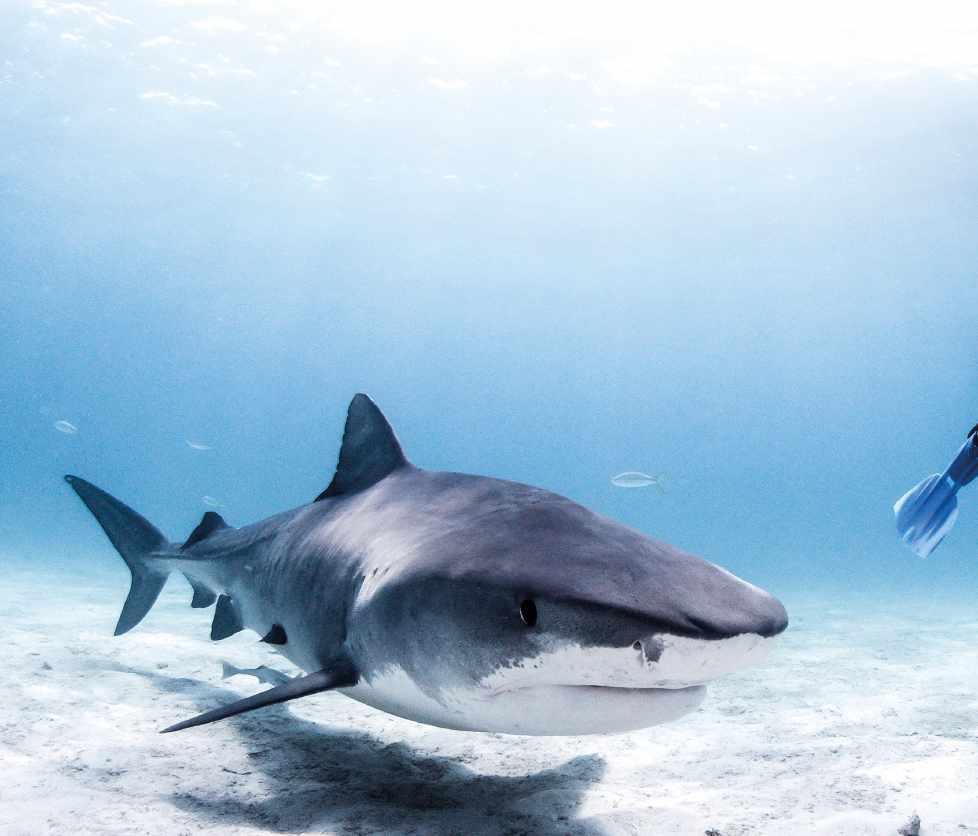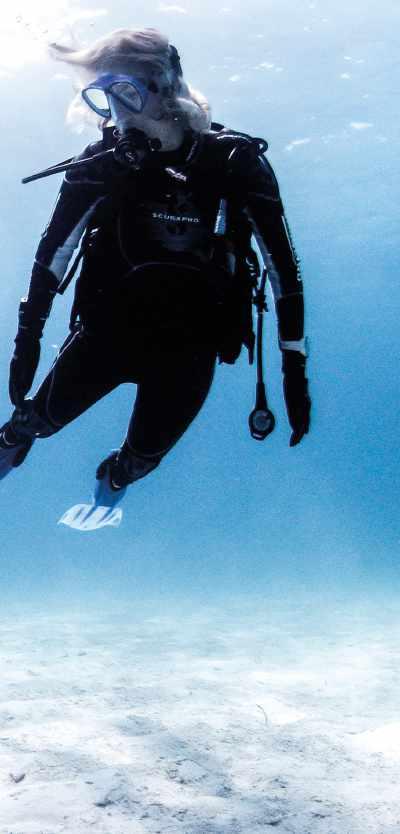
6 minute read
A life below the surface with the Ocean’s Rulers
By My Tiljestam. Photo: Andy Casagrande
Shark defender Emma Casagrande devotes her life to spreading knowledge and understanding, using her secret weapon – her camera. With it she documents her experiences and adventures in the ocean for the whole world to share.
Advertisement
“It’s an amazing experience to see the animals up close underwater, in their own habitat. Through my pictures, I want to share the beauty of what lives below the surface. Photos and films allow me to spread information about our oceans around the world, so people can see and experience what’s deep down at the bottom of the ocean, even if they haven’t been at that particular place themselves,” says Emma.
“Oceans are so extremely important to our planet. Large parts of the oceans are dying extremely quickly because of lack of knowledge, so it’s important to act now,” she continues.
SHARKS DO NOT EAT PEOPLE. Emma has swum with white sharks and tiger sharks and dived in oceans all over the world.
“It’s important to be calm and confident in the water if you want sharks to come close enough so that you can film them. If you move too fast, the sharks might swim away, and then you’ll have to wait again. The various shark species behaves quite differently, so it’s important to be knowledgeable when you are close to them. Staying calm and attentive works best with all wild animals,” she explains.
Sharks eat fish and seals… not humans. Virtually all shark accidents are bait-related; that is, when a diver swims with caught fish, or bait. Sharks can also misinterpret what they see.
“A surfer can easily be mistaken for a seal as sharks see surfers from below, like silhouettes on the surface. It is much safer to dive with the sharks under the water so they can see what you are, than to surf on top of the water. If you’ve just caught a fish and are swimming around with it attached to your waist, things can easily go wrong. Accidents can happen even though humans aren’t actually on the sharks’ menu. I have a great deal of respect for these fascinating animals when I swim in their company,” says Emma.
She loves to take still pictures underwater but also films sometimes. Emma travels and works with her husband Andy, an underwater photographer, and his team.
“I learn so much from the knowledgeable and experienced people who are part of the filming team, about photo and film creation, but also about sharks and other marine wildlife. Through my pictures, I want to show the importance of our oceans’ underwater life, so that more people choose to contribute to a better world. I absolutely believe that people want to do the right thing, but they may not always have the knowledge they need,” says Emma, who has been an ambassador for The Perfect World Foundation since it was founded in 2010.

10,000 SHARKS ARE KILLED EVERY HOUR. Emma is what’s known as a Shark Angel – she protects vulnerable sharks and their habitat. The Shark Angels organization spreads awareness about the effects of ‘shark finning’, which is when fishermen catch sharks, cut off their fins and throw them back in the water. Alive. Where they suffer a painful death, either by drowning or blood loss. Their fins are mainly used in shark fin soup. Asia is the biggest consumer of shark fins, but large suppliers are also found in Europe and the USA. The shark fin trade is increasing even though it’s illegal in several countries, and several shark species are threatened with extinction. Shark Angels estimate that around 73 million sharks are killed each year. That’s around 10,000 every hour.
“If we can stop the demand, we can reduce the problem. Some people believe that shark fins boost sexual potency or cure cancer. It’s important to get people to understand that this isn’t true. Shark fins are made of cartilage, just like our ears and nose. And although sharks hardly ever suffer from cancer, you can’t get their cellular composition by eating their fins. It’s also extremely important to find other sources of income for impoverished fishermen who have to support their families. For example, diving centres could replace the fishing,” says Emma. “Best for our oceans would be if we fished responsibly, so that the fish stocks had the chance to grow at the same rate. We have to temporarily stop catching the species that are threatened to die out. Sometimes we take too much from the ocean when we should be letting it rest and recover instead.”
This is exactly what Emma experienced recently when she was in Norway to swim with orcas. The Norwegian fjords have always been full of life, with fish, orcas and whales. But a number of years ago, Baltic herrings stocks were largely depleted in the Norwegian fjords and the orcas stopped coming.
“There was a ban on fishing, and after a while the number of herrings increased again and the orcas came back. Nature has an incredible power to heal itself, if we just give it the chance to do so,” she says.

YOU DON’T NEED TO BE ANGRY OR PERFECT. Nature needs to get back in balance. Emma is hopeful even though the situation is serious. She believes that her positive outlook on life is necessary for her to be able to inspire others to take care of the ocean, as we take care of our own families or gardens.
“It’s easy to get overwhelmed and feel powerless when you think of everything that’s going on, but I choose to believe in the future, and that we can actually make a difference. You don’t need to be angry or perfect to save the world. Nobody’s perfect! It’s easy to find faults with everything you do, if you choose to do so. Instead, I believe in being open to good ideas, spreading them, and taking things one step at a time,” says Emma.
“Start by making a change in your daily life that contributes to a better environment. When it becomes a habit, move on to the next change. 500 million straws are used in the US every day. A simple change would be to stop using straws at home or in restaurants. Over 8 million tonnes of plastic ends up in the oceans every year. If this continues, there’s going to be more plastic than fish in the ocean,” Emma states before finally adding,
“We have to stop dumping plastic and other debris in the ocean. Lots of the animals in our oceans die from our plastic waste. We can all contribute by changing our daily habits so that we produce less waste. Recycling is good, but I think the real solution is to reduce our consumption. It could be something simple like keeping food in glass or stainless steel containers. Or eliminating single use plastic like plastic bags, straws and food wrap. Bringing a reusable bag with you to the shops. Eat less meat, take your bike if you can. Most of what we do is through habit rather than need. High five to you for every habit you change!”










